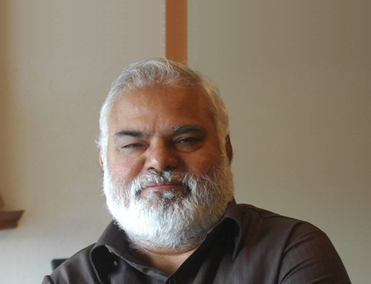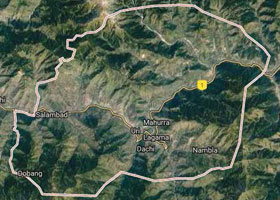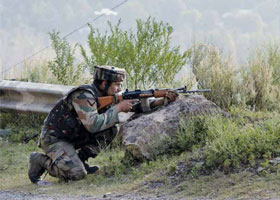
India’s recent surgical strikes against Pakistan on perceived terrorist positions along the Line of Control (LoC), have been well commended by the world. Our nation though, has been gripped in a war of words since Pakistan’s attack on Uri, which, unarguably, deserves the most severe condemnation. Words, like missiles, have been flying through the television screens and strong opinions have dominated the black and white jungle of words in the print media. Former Big Chiefs of Armed Forces have been roped in as panelists, by aggressive TV anchors, to give further insight into why the war cry should get shriller. Probably in social gatherings too, the mood of the nation has been reflecting the belief of `enough is enough’ regarding what many allege is soft posturing with Pakistan, for too long a time.
This `revengeful’ feeling has been resonating ever since the Pathankot Airbase attack, followed by the continuing unrest in Kashmir, which continues to sizzle for over three months now. The government in Kashmir appears paralysed, thus making it look ineffective. Life continues to be on the edge in the valley. Given the sensitive situation, since decades, the central government too has been treading with caution.
Amidst this cacophony are harsh facts which are being overlooked in the ambition to garner TRPs and flaunt knowledge of war strategies. Is the government supposed to act on these shrill arm chair opinions and look at the issue from an emotional angle alone? Can it give a `tit for tat’ without taking into account various other factors like our other hostile neighbouring countries and international ramifications of a war with Pakistan?
It is pertinent to also introspect on the practical aspects of what it takes for preparation of a war with Pakistan. The reasons being the hostile geo-political scenario in the Northern borders including Kashmir region, which not only requires time for positioning of the troops but also the fear of imminent attack from China for want of China Pakistan Economic Corridor (CEPC). I would like to narrate this reality through my own experience.

It is a nostalgic recall as I am a soldier and a war veteran, posted, during the 1971 Indo-Pak War, in the very area in Uri - the location of the recent Pakistan assault. Between the time when war mongering started, somewhere in March 1971, and the actual launch of the war in December 1971 – it was a good nine months. The time required from conception to the birth of a human being.
I distinctly remember that my marriage date was fixed for 28th March, 1971. I took leave and went to my native village, Kandithempettai in Thanjavur district of Tamil Nadu, to get married. Apart from the congratulatory telegrams that poured in, the house wore a festive look. Being the bridegroom, my family was invited by the bride’s family for various ceremonies that precede the actual D-Day.
In fact, a marriage ceremony in our village is a grand affair – it is the culmination of 10 day of festivities, religious and social events. It is the time for congregation of near and distant relatives, thus turning the house into a large family gathering. It also means making elaborate breakfast, lunch and dinner for all of them. Goodies are enthusiastically prepared by the women of the house and a general air of positivity and happiness rents the air. Everyone prays for auspicious things to happen.
However, my life has always been full of dramatics. Amidst the marriage fervour and gaiety, tragedy struck when the next door neighbour of my in-law’s house, suddenly passed away on the very day of marriage. There was a lot of crying and the entire neighbourhood was overcome with grief. A village has an independent row of houses but each one sharing a symbiotic relationship with one another. So, how can there be no mourning for someone who is like a family member? As if this was not enough, I received a telegram from my Command headquarters asking me to come back immediately. There is little choice when you are called back from leave. You either go back promptly or get court martialed and face severe punishment. Thus, within 48 hours of my wedding, I had to leave my new bride and get back to duty.
Those days, war mongering was going on just as we see today. A sea of Bangladeshis had filtered into the country due to atrocities on them by West Pakistan. They were being accommodated as refugees in various States. Their sheer number was putting immense strain on India. Indira Gandhi, the then Prime Minister, was garnering international support for India, in the event of a War with Pakistan. She analysed that it made more economic sense to wage a war against Pakistan and liberate Bangladesh. She signed the Indo-Russian friendship treaty, to nullify China’s support to Pakistan. The USA too had a favourable eye for Pakistan, which had her worried. When Gandhi discussed about going to war in April 1971 with the then Army Chief, General Sam Manekshaw, he candidly refused to go to war immediately and said he needed time to bring troops to advanced positions and select the right time, that is winter, when snow in the borders would dampen Chinese intervention.
I am a war veteran, posted, during the 1971 IndoPak War, in the very area in Uri. Between the time when war mongering started, somewhere in March and the actual launch of the war in December – it was a good nine months
I was asked to report at Leh. My battle commander, Major Karambil Rishi Babu and my other colleagues sympathised with me but for a warrior, his country comes first. From there, our unit moved to Pathankot, where only four residential quarters existed and were allotted as per the discretion of the Commander. The rest of them were given monthly accommodation allowance of Rs.100 or Rs.200. Although I was the junior most, I was allotted one of those quarters, considering that I was newly married. The affinity and bonding you have in the Army is unique and overwhelming. Elated, I went back to my village to fetch my wife.

However, there came another twist to this tryst. The day we reached Pathankot, we were asked to pack up and move to advanced position. So, despite having brought my wife from so far, I could not settle down with her. I felt bad that she had come to this strange land and she would have to fend for herself. All the families were clubbed in the four residential quarters. Two to three families were huddled in each quarter. A sack of rice, pulses and other food stuff was provided which implied that it was going to be a long haul for us at the border. We had to move to RS Pura (Randhir Singh Pura). I am elaborating this sequence of events to understand that war does not happen in a few days’ time. It takes several months to launch a war.
RS Pura is located along the Punjab border of Pakistan. Not many know that here, army units are temporarily located in agricultural lands. Whenever such skirmishes take place and the army takes position on the border, it is the farmers who suffer the most. We occupy their fertile land, from which they earn their bread and butter. They are given just a modest amount of compensation, which hardly makes up for the destruction of their crops and fields. For, the Army unit makes a makeshift operation area that involves putting up tents and other facilities. In this case, we were deployed for nearly nine months.
Back in Pathankot, the residential quarters are in the vicinity of the Air Force Station. This meant that my wife and others had to be safe in case of an air attack from Pakistan. The ladies were asked to dig trenches by themselves so that they could sleep in them during night time.
On 3rd December, Pakistan launched an air attack. We were all engrossed, fighting the war, with a very positive attitude. We were firing bombs from the 120 MM brand Mortar. One night a bomb fell directly into our operational area. One of our colleagues was seriously injured. The attack was going on, full-fledged. Our Commander, Babu, was leading from the front, but he showed his humane side, as despite being at the helm of the attack, he put the injured soldier in his jeep and drove at fast speed to Jammu and admitted him in the hospital. It was a two hour drive, so he came back in four hours and got back into action. Finally, war was over on 16th December, 1971 and we returned to Pathankot after the ceasefire.
The celebration and triumph of victory over Pakistan gripped the nation. On our return by train from Pathankot to Chennai, I witnessed intense and unprecedented patriotism, which overwhelmed me. Wherever the train halted, people were thronging railway stations and showering us with food and all kinds of gifts. The railway platforms were filled with such well-wishers, cheering us with slogans of `India Zindabad.’ By the time we reached Chennai, I had so many gifts that I did not know what to do with them.
Today, the tragedy of the country is that, we need to ask, are we ready for war? India has to deal with problems from several neighbouring nations. Despite it pumping in money from the tax payers’ treasure chest and despite several concessions, why is it that people in the Kashmir valley are not happy? Why are the people there not with us? Why do they address us as `you Indians’? If they are with us, then are only a few militants, creating havoc? If it is a question of only a handful of militants, then why is it that the Army is not able to be on top of them?
Also, what is the morale of our Armed Forces presently? We have witnessed the One Rank One Pension (OROP) agitation, where hundreds of veteran soldiers and officers, in an unprecedented move, protested for several months at Jantar Mantar and took out public rallies. The defence personnel are also piqued about the seventh pay commission. In March this year, the three service chiefs made a representation to the `Empowered Committee of Secretaries’, headed by the cabinet committee. When that failed, the service chiefs kept the implementation of the 7th pay commission, in abeyance. The Defence Minister then ordered them to implement it. It must be noted that their petition in the Supreme Court, stated that defence personnel should not be treated in a "shabby manner.’’
We must understand that a soldier or an officer considers his duty above his comfort zone and salary. But the fact that they have shown resentment, perhaps indicates that the morale in the Armed Forces, may not be very high.
So, given these circumstances, the moot question finally is, should India go for a full-fledged war? We need to also introspect as to what we have achieved so far by going to war, be it against Pakistan or Sri Lanka.
By DR (Col.) A. BALASUBRAMANIAN
editor-in-chief